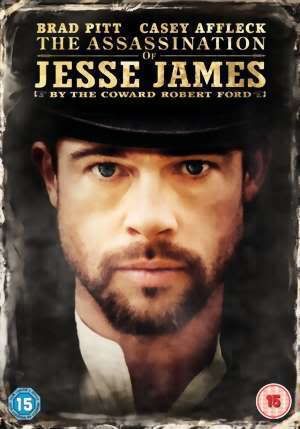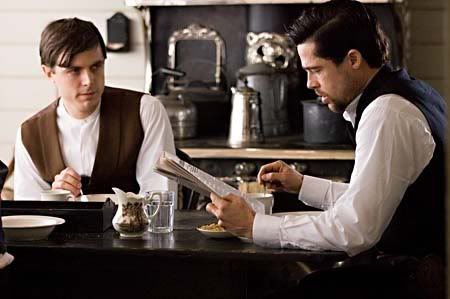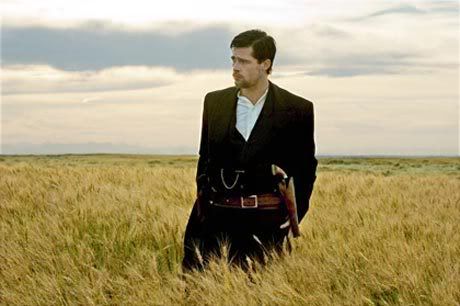The Assassination of Jesse James by the Coward Robert Ford (2007, Andrew Dominik)

Here we are again, campers! As always, this thread is a spoiler-free zone (as in, nothing is 'spoiler-tagged') so only read on if you've already seen the film or don't really care about knowing the plot.

My initial thoughts during the first half hour of the film were 'gorgeous cinematography and a gorgeous score'. Not surprising, I guess, because Messers Deakins and Cave were responsible for them. Plus points there, then - it looks and sounds great.
Casting - Casey Affleck is spot on in his characterization of the nervy, hard-to-like Bob Ford. That he reminded me of that weirdly-voiced bloke from the
Police Academy films is by the by: we're not meant to root for him in any sort of traditional heroic manner. Sam Rockwell is fine too as the slightly less obnoxious Ford brother, Charley, and there are solid turns by the likes of Sam Shepard and Garret 'two parts in
Deadwood' Dillahunt.

Ok, I'm skirting round the main issue here - the lead role. Pitt doesn't do it for me, simple as that.
We're meant to have a Jesse James who is in turns charismatic and confused. Likeable and hateful. Garrulous but very much 'damaged goods'. And vengeful. How more vengeful can he get? The answer is none.
None more vengeful.
Brad, unfortunately in this reviewer's eyes, is stultifyingly wooden throughout. His laconic drawl which passes for 14 years of Confederate angst is no more convincing now than it was in
Kalifornia or
Thelma and Louise, fifteen or more years ago. In fact, the scene outside the church where he admonishes Bob and Charley for sneaking off to have a sly conversation had me actually laughing. Instead of a release of paranoid emotion we had something akin to Keanu Reeves stubbing his toe in the bath.
It's sad because a film as meticulously detailed as this deserves someone with much more weight (as opposed to merely box office draw and a producer's cash and contacts) to carry the piece, if need be, on his back.

That this doesn't completely ruin
TAoJJbtCRF (catchy, eh?) in my eyes is probably because the emotional heartbeat of the film comes from Affleck.
There's a lot of the film that I like, however. The measured flow of melancholy seeping from its every frame, the aforementioned beautiful camerawork and music and the slow, almost dreamlike pace. It could have done with a few minutes knocked off here and there (we're practically 2 1/2 hours long), especially as one gets the feeling that the movie has 2 or 3 distinct endings. It's almost as if Dominik couldn't bear to let his baby go...
I also liked the narration, which seemed to come from one of the very Dime Store novels where Bob first read about, and subsequently venerated, Jesse. There's the feeling of a modern-day stalker about him.

In closing I'd say that, thematically at least,
The Assassination of Jesse James by the Coward Robert Ford is similar in many ways to John Hillcoat's (another Aussie director with heavy input from Nick Cave)
The Proposition.
Both films meander into the territory of the young and impressionable fan/sibling who eventually comes to realise that the mythical outlaw figure they've been enraptured with for so long is, bluntly, bad news. Of course, Bob Ford's final motivation for killing Jesse is a confused mixture of fear, revenge and the desire to be famous while Charlie Burns (in Hillcoat's film) eventually becomes wearily repulsed by his brother's antics...
The Proposition is a film that I've come to love more with each and every subsequent viewing. I love the poetic quietness of it, for instance. The stillness, the ambiguity.
I really don't know if I'll come to love
The Assassination of Jesse James over time, however beautifully crafted it appears.

Your thoughts, MoFo? Was it a triumph or a letdown?


 ), and it explains Jesse's carelessness, I don't know that it quite explains what we see in the movie, which resembles resignation more than anything else. This may be a misinterpretation on my part, but I've noticed a number of other people make the same observation. Intentional or not, I think most people come away from the titular scene with the idea that James wasn't particularly surprised or perturbed by Ford's betrayal. Indeed, he almost seems to think it a fitting end.
), and it explains Jesse's carelessness, I don't know that it quite explains what we see in the movie, which resembles resignation more than anything else. This may be a misinterpretation on my part, but I've noticed a number of other people make the same observation. Intentional or not, I think most people come away from the titular scene with the idea that James wasn't particularly surprised or perturbed by Ford's betrayal. Indeed, he almost seems to think it a fitting end.






